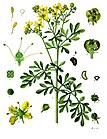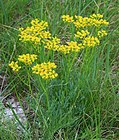Note: This is a project under development. The articles on this wiki are just being initiated and broadly incomplete. You can Help creating new pages.
Ruta graveolens - Sitaba
Sitaba is an evergreen shrub that can grow up to 0.50 metres tall. It has edible, medicinal and miscellaneous uses. All parts of this plant are poisonous in large quantities. It should not be used at all by pregnant women since it can induce abortions. The sap contains furanocoumarins, sensitizing the skin to light and causing blistering or dermatitis in sensitive people.
Contents
[hide]- 1 Uses
- 2 Parts Used
- 3 Chemical Composition
- 4 Common names
- 5 Properties
- 6 Habit
- 7 Identification
- 8 List of Ayurvedic medicine in which the herb is used
- 9 Where to get the saplings
- 10 Mode of Propagation
- 11 How to plant/cultivate
- 12 Commonly seen growing in areas
- 13 Photo Gallery
- 14 References
- 15 External Links
Uses
Improves digestion strength, Amenorrhoea, Worm infestation, Giddiness.[1]
Parts Used
Chemical Composition
Common names
| Language | Common name |
|---|---|
| Kannada | Haavu nanjina gida, Naagadaali |
| Hindi | Pismarum, Sadab |
| Malayalam | Aruta, Somarayam |
| Tamil | Arooda, Aruta |
| Telugu | Arudu, Sadapa |
| Marathi | NA |
| Gujarathi | NA |
| Punjabi | NA |
| Kashmiri | NA |
| Sanskrit | Guchhapatra, Sadapaha |
| English | Common Rue |
.[2]
Properties
Reference: Dravya - Substance, Rasa - Taste, Guna - Qualities, Veerya - Potency, Vipaka - Post-digesion effect, Karma - Pharmacological activity, Prabhava - Therepeutics.
Dravya
Rasa
Tikta (Bitter)
Guna
Laghu (Light), Teekshna (Strong)
Veerya
Ushna (Hot)
Vipaka
Katu (Pungent)
Karma
Pitta
Prabhava
Habit
{{Habit|Shrub}
Identification
Leaf
| Kind | Shape | Feature |
|---|---|---|
| Pinnate | Alternate | Leaves strong smelling, alternate, pyramidal or oblong, 3-8 cm long; leaflets subsessile, obovate or elliptic, entire or obscurely crenate at margin, obtuse at apex. |
Flower
| Type | Size | Color and composition | Stamen | More information |
|---|---|---|---|---|
| Bisexual | Inflorescences dichasial | Yellow | 8-10 | 6-12 cm across; bracts leafy, lanceolate, narrow at base, entire or crenate, acuminate, 5-7.5 x 2-2.5 mm; pedicels ca 8-10 mm long, glabrous. Flowers 8-10 mm across. |
Fruit
| Type | Size | Mass | Appearance | Seeds | More information |
|---|---|---|---|---|---|
| Capsule | 6-8 mm across | Capsules 4 or 5 lobed, 1 or 2 seeded | Seeds ca 2 mm long, angled, pitted and brown. | {{{6}}} |
Other features
List of Ayurvedic medicine in which the herb is used
Where to get the saplings
Mode of Propagation
How to plant/cultivate
Season to grow
Soil type
Propagation
Commonly seen growing in areas
Tropical area, Sub tropical area
Photo Gallery
References
External Links
- Ayurvedic Herbs known to be helpful to treat Improves digestion strength
- Ayurvedic Herbs known to be helpful to treat Amenorrhoea
- Ayurvedic Herbs known to be helpful to treat Worm infestation
- Ayurvedic Herbs known to be helpful to treat Giddiness
- Herbs with Leaf used in medicine
- Herbs with common name in Kannada
- Herbs with common name in Hindi
- Herbs with common name in Malayalam
- Herbs with common name in Tamil
- Herbs with common name in Telugu
- Herbs with common name in Sanskrit
- Herbs with common name in English
- Index of Plants which can be propagated by Seeds
- Index of Plants which can be propagated by Cuttings
- Herbs that are commonly seen in the region of Tropical area
- Herbs that are commonly seen in the region of Sub tropical area
- Herbs
- Rutaceae




